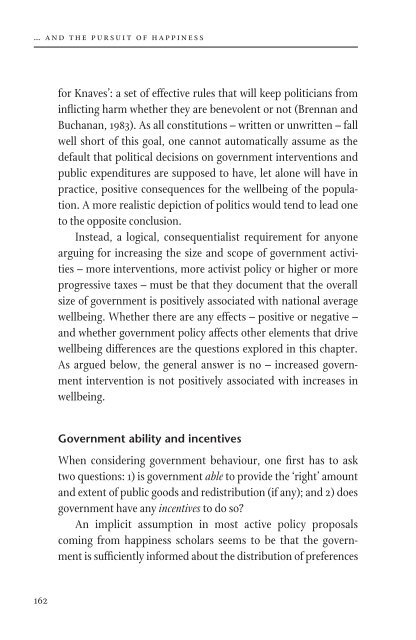… and the Pursuit of Happiness - Institute of Economic Affairs
… and the Pursuit of Happiness - Institute of Economic Affairs
… and the Pursuit of Happiness - Institute of Economic Affairs
You also want an ePaper? Increase the reach of your titles
YUMPU automatically turns print PDFs into web optimized ePapers that Google loves.
<strong>…</strong> <strong>and</strong> <strong>the</strong> pursuit <strong>of</strong> happiness<br />
wellbeing <strong>and</strong> <strong>the</strong> size <strong>of</strong> government<br />
for Knaves’: a set <strong>of</strong> effective rules that will keep politicians from<br />
inflicting harm whe<strong>the</strong>r <strong>the</strong>y are benevolent or not (Brennan <strong>and</strong><br />
Buchanan, 1983). As all constitutions – written or unwritten – fall<br />
well short <strong>of</strong> this goal, one cannot automatically assume as <strong>the</strong><br />
default that political decisions on government interventions <strong>and</strong><br />
public expenditures are supposed to have, let alone will have in<br />
practice, positive consequences for <strong>the</strong> wellbeing <strong>of</strong> <strong>the</strong> population.<br />
A more realistic depiction <strong>of</strong> politics would tend to lead one<br />
to <strong>the</strong> opposite conclusion.<br />
Instead, a logical, consequentialist requirement for anyone<br />
arguing for increasing <strong>the</strong> size <strong>and</strong> scope <strong>of</strong> government activities<br />
– more interventions, more activist policy or higher or more<br />
progressive taxes – must be that <strong>the</strong>y document that <strong>the</strong> overall<br />
size <strong>of</strong> government is positively associated with national average<br />
wellbeing. Whe<strong>the</strong>r <strong>the</strong>re are any effects – positive or negative –<br />
<strong>and</strong> whe<strong>the</strong>r government policy affects o<strong>the</strong>r elements that drive<br />
wellbeing differences are <strong>the</strong> questions explored in this chapter.<br />
As argued below, <strong>the</strong> general answer is no – increased government<br />
intervention is not positively associated with increases in<br />
wellbeing.<br />
Government ability <strong>and</strong> incentives<br />
When considering government behaviour, one first has to ask<br />
two questions: 1) is government able to provide <strong>the</strong> ‘right’ amount<br />
<strong>and</strong> extent <strong>of</strong> public goods <strong>and</strong> redistribution (if any); <strong>and</strong> 2) does<br />
government have any incentives to do so?<br />
An implicit assumption in most active policy proposals<br />
coming from happiness scholars seems to be that <strong>the</strong> government<br />
is sufficiently informed about <strong>the</strong> distribution <strong>of</strong> preferences<br />
in <strong>the</strong> population. In o<strong>the</strong>r words, <strong>the</strong> government knows what<br />
people want. This assumption is inconsistent with <strong>the</strong> complexity<br />
<strong>of</strong> any modern society, as real-world politicians face a massive<br />
Hayekian information problem (Hayek, 1960). In small, local<br />
societies, leaders may have sufficient knowledge to direct policies<br />
towards those in actual need or towards groups with specific preferences.<br />
Yet in only slightly larger societies, it becomes impossible<br />
to know enough about <strong>the</strong> preferences <strong>and</strong> needs <strong>of</strong> <strong>the</strong> population<br />
to precisely direct policies in such a way. Instead, politicians<br />
arguably need to rely on what <strong>the</strong> typical or median person in <strong>the</strong><br />
population prefers.<br />
Yet even if politicians knew <strong>the</strong> approximate preferences <strong>of</strong><br />
<strong>the</strong> median voter, <strong>the</strong>y would still face a heterogeneity problem:<br />
although <strong>the</strong> government might be able to get <strong>the</strong> right public<br />
goods provision to <strong>the</strong> median voter, a large share <strong>of</strong> people would<br />
find specific public goods over-provided <strong>and</strong> ano<strong>the</strong>r share would<br />
find <strong>the</strong>m under-provided. Consequently, most people would<br />
be paying <strong>the</strong> wrong amount <strong>of</strong> taxes for public goods provision<br />
targeted merely to <strong>the</strong> median voter. They would be paying for<br />
not only <strong>the</strong> wrong level <strong>of</strong> public goods but also <strong>the</strong> wrong mix.<br />
A second problem is that <strong>of</strong> how decisions are reached in<br />
politics. Dictatorships may arguably be able to focus policies on<br />
meeting <strong>the</strong> desires <strong>of</strong> relatively narrow elites while providing<br />
enough order <strong>and</strong> public goods to prevent social unrest. In principle,<br />
democracies ought to be different <strong>and</strong> provide a wider<br />
set <strong>of</strong> necessary public goods in accordance with <strong>the</strong> needs <strong>and</strong><br />
preferences <strong>of</strong> <strong>the</strong> population. Owing to information problems,<br />
being able to do so may never<strong>the</strong>less be prohibitively difficult.<br />
In addition, politicians <strong>of</strong>ten have incentives that aggravate this<br />
problem <strong>and</strong> undermine <strong>the</strong>ir willingness to try.<br />
162 163












